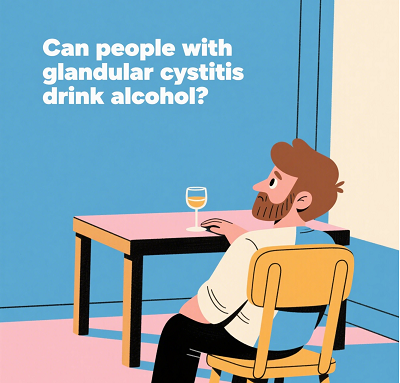Can You Drink Alcohol with Cystitis Glandularis? The Effects of Alcohol on Symptoms and Practical Drinking Guidelines
Cystitis glandularis is not unfamiliar to anyone, and when suffering from it, patients tend to experience some bladder irritation symptoms, such as frequent urination, urgency, painful urination, urethral burning and so on. If you are unfortunate enough to find yourself experiencing these symptoms, you should be vigilant and go to the hospital for professional diagnosis and treatment as soon as possible to prevent the condition from worsening.

In order to improve the phenomenon of the disease, patients with cystitis glandularis usually need to pay attention to some daily behavioral taboos, such as avoiding spicy and stimulating foods, and high-sugar foods, paying attention to personal hygiene, to ensure the quality of sleep, etc., so when cystitis glandularis brought about by the constant pain makes you incomparably tormented, do you want to know whether patients with it can drink alcohol?
For those diagnosed with cystitis glandularis, managing the symptoms of the condition is key to maintaining quality of life. While diet and lifestyle play an important role, alcohol consumption is also a frequent concern. Today, we're going to explore how alcohol actually makes affections. In case you really want to drink, how can you do it to minimize the damage?
Alcohol's Effect on the Symptoms of Cystitis Glandularis
1. Bladder Irritation
Compounds such as ethanol contained in alcohol, especially beer, wine and spirits, can irritate the lining of the bladder. Normal people may not feel much, but people with cystitis glandularis have already inflamed and fragile bladders, and this irritation is like rubbing salt in the wound, making the inflammation worse and leading to increased pelvic pain, urinary urgency and frequency. In addition, acidic or high-sugar alcoholic beverages (such as citrus cocktails or sweet wines) may also alter the pH of the bladder, which can aggravate these symptoms.
2. Effects on the Immune System
Chronic alcohol consumption can weaken the immune system, making it more difficult for the body to control inflammation or fight off infections that may worsen cystitis glandularis. While moderate drinking may not have a significant effect, chronic excessive drinking can impair the body's ability to heal and maintain a healthy bladder.
3. Interactions with Medications
Many people with cystitis glandularis rely on medications to control their symptoms, such as pain relievers, antihistamines, or anti-inflammatory drugs. For example, taking the Traditional Chinese Medicine Diuretic and Anti-inflammatory Pill can help patients reduce bladder inflammation, promote urine flow, relieve discomfort, and prevent symptoms from recurring. However, alcohol can interfere with the efficacy of these medications or increase their side effects, which may hinder the disease-healing process.
Alcohol Drinking Guidelines for People with Cystitis Glandularis
While avoiding alcohol altogether may be the safest option for managing cystitis glandularis, there are times when socializing or life stresses make it impossible to avoid drinking. The following drinking guidelines may help you suffer less:
1. Determine Your Tolerance
Everyone's manifests is different and their sensitivity to alcohol varies wildly. To determine your tolerance, keep a symptom diary to track how different types and amounts of alcohol affect you. Make a note of the type of drink (e.g., wine, beer, spirits), the quantity, and any symptoms produced. Over time, this can help you determine which drinks are safer for you.
2. Choose Low-stimulant Drinks
Not all alcoholic beverages are equally stimulating. If you must drink, choose types that are less likely to irritate your bladder or dilute the alcohol with water or ice, which can reduce the likelihood of bladder irritation.
3. Stay Hydrated
It is best to drink plenty of water after drinking alcohol. Drink at least one glass of water for every glass of wine. Staying hydrated helps to dilute the urine, ensuring a favorable urinary environment and reducing the likelihood of bladder irritation.
4. Limit Alcohol Consumption
Drinking alcohol in moderation is especially important. Drinking too much alcohol can undoubtedly lead to a worsening of the condition, even to the point of irreversibility. If you notice a worsening of symptoms, you should stop drinking.
5. Avoid Drinking on an Empty Stomach
Drinking alcohol without eating something increases the rate of alcohol absorption, which can worsen the effects of alcohol on the bladder! You need to eat a well-balanced diet containing protein, fiber, and carbohydrates before drinking alcohol, which slows down the absorption of alcohol and reduces the effects on the body of a person with cystitis glandularis.
In addition, consuming medications such as Diuretic and Anti-inflammatory Pill can be a useful approach for those treating cystitis glandularis. These medications are anti-inflammatory and antiseptic, helping to reduce bladder inflammation and better control symptoms, as well as reducing the risk of recurrence, and may even address the root cause of the discomfort.
Having cystitis glandularis doesn't really mean that you can't drink at all. With the right strategies, you can effectively manage your symptoms and enjoy it. However, it requires you to be attentive to your specific situation and explore treatment options to find what works best for you.



